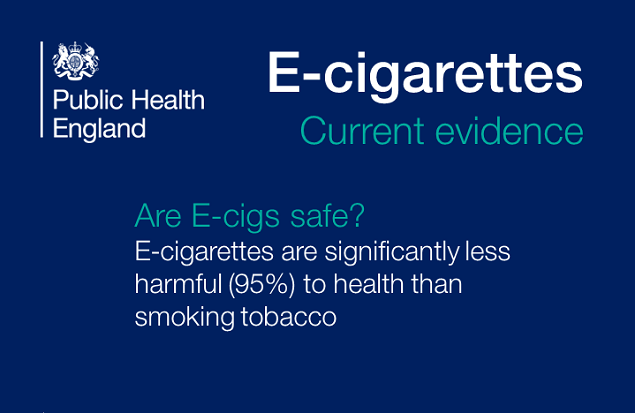
The world of vaping is a pretty busy place. A week doesn’t go by without some absurd statements being made somewhere about e-cigarettes, some new devices being released, more scientific evidence becoming available on the risks and benefits of vaping, legislation being proposed or some great blog posts being published by vapers. Keeping up with all of this isn’t easy, so we’re happy to present the first of our weekly roundups of what’s been going on in the industry: the week in vaping.
(Technically, we’re focusing on what’s happened this week, but since we’re publishing on Fridays, this post will include everything from the 28th of August through to today. However, we’ll break that rule whenever it seems appropriate. Because that’s how we roll.)
Responses to the Public Health England Report
With such fervent interest in the e-cigarette debate, Public Health England’s declaration that e-cigarettes are 95 percent safer than smoking could hardly go unchallenged. And that challenge came in the form of an anonymous editorial in the Lancet – yes, a peer-reviewed journal sunk to publishing an anonymous editorial – which alleged that the 95 percent safer conclusion was based on a single piece of research (it wasn’t) and that the paper was marred by conflicts of interest. They point out that Riccardo Polosa served as a consultant to an e-cigarette company (how dare he, right?), and that another author worked as a consultant to manufacturers of quit-smoking products.
In fairness to the authors, they also point out that this paper was ultimately opinion-based, and there was a lack of hard evidence for most of the rated criteria for most of the nicotine-containing products included. Carl V. Phillips criticized this paper when it was released, on these grounds and more (as well as expressing some doubt about the 95 percent figure itself, and pro-vaping advocates’ relationship with science in general)
The Lancet editorial was gleefully reported in the press – the Guardian said the conclusion was based on “research funded by organizations with links to the tobacco industry” – but also attracted some notable criticism. Christopher Snowdon, Dr. Farsalinos, the Electronic Cigarette Industry Trade Association, Dick Puddlecote and David Nutt (an author of the original paper), among others, pointed out the various problems with the editorial. Dr. Farsalinos’ post was entitled “What is the only argument for criticizing Public Health England report on e-cigarettes? Funding of 1 of the 185 cited studies.”
For me, though, the most pertinent comment comes from Christopher Snowdon’s post:
This is a technique the magazine has been perfecting ever since it laid into the now-legendary scientific pioneer John Snow in the 1850s. When Snow concluded that cholera was spread through the water supply and not, as the medical consensus had it, through the air, The Lancet accused him of being in the pay of the polluting industries. And they were right. He was. But that did not stop germ theory being right and miasma theory being wrong. The Lancet finally got round to correcting its notoriously terse obituary of Snow two years ago. One might hope that by now the magazine would have learned how to play the ball rather than the man.
Public Health England also responded to the editorial themselves, pointing out that they didn’t base their whole conclusion on a single paper (because who would?). Martin McKee and Simon Capewell responded to this response and the editorial, weakly claiming that the single study was the only “substantive” reference in support of the message.
New E-Cigarette Research
There have also been a few new studies and reports this week, with the biggest news being that new National Health Interview Survey data shows that – contrary to claims that e-cigarettes are “renormalizing” smoking – smoking is continuing to decline as vaping becomes more common. Michael Siegel has blogged about this, but the basic message is that, if anything, smoking is declining more quickly in recent years, and although we can’t definitively say it’s because of vaping, it probably is.
Siegel has also criticized an article published in JAMA which discourages smokers from quitting using e-cigarettes.
Stanton Glantz has published a new piece of research, in which he claims that e-cigarettes will have a negative impact on public health overall if they turn out to be 20 to 30 percent as bad as cigarettes. However, as the Vaping Giraffe is quick to point out, means that he’s actually suggesting that e-cigs will have a positive impact on public health.
Some good news comes in the form of another new study showing that both those who switch to vaping and dual users (who also smoke) reduce their exposure to carbon monoxide, nicotine and acrolein.
Finally, the Center for Environmental Health has released a report with claims that there were “high levels of cancer-causing chemicals in the majority of nearly 100 e-cigarettes tested.” The report, however, offers very little information about the method used, and compares the levels to California’s proposition 65 limits rather than the amount present in cigarettes. They’re using the report as a basis for taking some (additional) legal action against e-cigarette manufacturers. We’ve addressed the report itself in a recent post.
Posts from Vaping Blogs
Although it’s a little older than a week, Fergus Mason wrote “10 Outrageous e-cig exaggerations that keep smokers smoking” for the Ashtray Blog, taking on some of the more insidious pieces of nonsense spread about vaping.
With the growing popularity of sub-ohm tanks – and the increasingly bewildering array of options – Vaping Cheap’s post on the best sub-ohm tanks for 2015 will be very useful to many new and veteran vapers alike.
And, if you’re worried about which mods you should depend on in the coming zombie apocalypse, Guide toVaping has you covered with their post “Top 5 mods that will help you survive the apocalypse,” complete with “survival perks” for each included option.
Phil Busardo also announces that Innokin will be adding another sub-ohm tank to their line-up: the iSub Apex, with all of the details in the post. They’re claiming that it’s going to be good for flavor, but the capacity is fairly small, at just 3 ml.

Spinfuel also reports that DirectVapor will be the first vendor to offer two new Tesla devices, the Tesla 80 W TC starter kit and the Nano 100 W TC starter kit, both of which are coming at some point this month. More details are available on DirectVapor’s site and in Spinfuel’s post.
Anti-Vaping Nonsense of the Week
A list article with the hilariously simplistic title “7 Reasons e-cigarettes are bad” (mkay) also went up on Inquisitr this week, running through anti-vaping tropes like “e-cigarettes contain plenty of cancerous chemicals” and “e-cigarettes might be just as addictive as tobacco” as if the author had based the whole article on a cursory reading of the Still Blowing Smoke campaign and assorted quotes from Stanton Glantz.
Jacob Sullum tore the article to pieces in his Reason post entitled “4 Reasons this article about e-cigarettes is bad,” primarily due to the author’s utter refusal to discuss their benefits (or risks) relative to cigarettes, taking cues from Michael Siegel’s post about the same disastrous piece of anti-vaping nonsense.
Sullum offers some advice for anyone hoping to demonize e-cigarettes:
If you follow Holger's model, you too can produce brazenly uninformative articles about e-cigarettes. Just remember to 1) implicitly equate e-cigarettes with conventional cigarettes, 2) avoid any clear discussion of relative hazards, 3) deny the existence of former smokers who used e-cigarettes to quit, and 4) mention children, preferably early and often.
The author, Dieter Holger, clearly feeling hard done-by (because of Sullum’s response, but primarily because of the onslaught of Twitter-rage from vapers), tried to respond to this criticism by saying “Often, we hear that e-cigarettes are safe in comparison to smoking, so I set out to present a counter-narrative which scrutinized the health effects of e-cigarettes.”
This is something like saying “we often hear that driving with seatbelts is safer than driving without seatbelts, so I set out to present a counter-narrative which scrutinized the health effects of seatbelts.” Jacob Sullum didn’t let him get away with it, presenting a further rebuttal to his response entitled “We don't need ‘decades of research’ to know vaping is safer than smoking.”
Legislation and Calls to Action
Finally, there are a few relevant calls to action from CASAA about impending legislation that will affect vaping in various states and nationwide. Firstly, the call to support HB 2058 is still active. The bill would change the “grandfather date” for the FDA’s regulation of e-cigarettes and likely save the whole industry in the process, and is definitely something to support.
The call to action about the California “special session” bills has been updated, calling on every California-based vaper and advocate to oppose numerous pieces of legislation which aim to redefine e-cigarettes as tobacco products and subject them to the same restrictions as cigarettes, as this post from VapeAboutIt explains. The legislative session closes on the 11th of September, so act now!
There is also a move in Chicago to tax smoke-free products, including e-cigarettes, and although the public meetings about these have passed (the last one being yesterday), you can still contact your city council member to voice your opposition to these bills.
Anything to Add?
So that’s what’s been going on in the world of vaping this week: irrational legislation, absurd articles, new products, more research, and baseless broadsides against the substantial argument in favor of e-cigs being harm reduction devices. Pretty much business as usual.
Did we miss any important stories or posts? Let us know in the comments and we’ll add them in!


